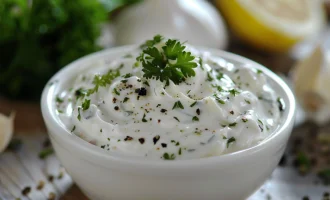The sauce you’re referring to is commonly known as Tzatziki, a beloved staple in Greek cuisine with roots that stretch back to the Ottoman Empire. This refreshing and cool sauce is made from yogurt, cucumbers, garlic, olive oil, and often dill, lemon juice, or vinegar, offering a perfect balance of tanginess and creaminess. Tzatziki is incredibly versatile and is served with a variety of dishes, including grilled meats, as a dip for bread and vegetables, or as a condiment in gyros and souvlaki.
- Greek yogurt 500 g
- Cucumber 200 g
- Garlic cloves 2 piece
- Extra virgin olive oil 2 tablespoons
- Fresh dill (chopped) 2 tablespoons
- Lemon juice 1 tablespoons
- Salt 1\2 teaspoon
- Freshly ground black pepper to taste
- Grate the cucumber and then squeeze out as much liquid as possible using your hands or a cheesecloth. This is crucial to avoid making the tzatziki too watery.
- In a mixing bowl, combine the strained Greek yogurt, drained cucumber, minced garlic, olive oil, chopped dill, lemon juice, salt, and pepper. Mix well to ensure all the ingredients are thoroughly combined.
- Cover and refrigerate the tzatziki for at least an hour. This allows the flavors to meld together, creating a more cohesive taste.
- Give the tzatziki a final stir before serving. It can be garnished with a sprinkle of dill or a drizzle of olive oil.
Storage Tips
Tzatziki can be stored in an airtight container in the refrigerator for up to 4 days. Due to the fresh ingredients, it’s not suitable for freezing, as the texture will be adversely affected upon thawing.
Useful Properties of the Main Ingredient
Greek yogurt, the base of tzatziki, is renowned for its health benefits. It’s an excellent source of calcium, protein, and probiotics, which are beneficial for digestive health. The high protein content makes it a filling and nutritious option, supporting muscle health and weight management.
Interesting Facts about the Sauce
- Culinary Crossroads: Tzatziki embodies the culinary crossroads of the Eastern Mediterranean and Middle Eastern cuisines, sharing similarities with Turkish cacık and Middle Eastern yogurt sauces.
- Versatility: Beyond its role as a condiment, tzatziki is often enjoyed as a cold soup during the hot summer months in Greece.
- Cultural Significance: Tzatziki is more than just a sauce in Greek culture; it represents a staple of hospitality and is often one of the first dishes served to guests.
Tzatziki sauce’s cooling properties make it an essential accompaniment to spicy dishes, offering a delightful contrast that has been cherished in Greek cuisine for generations. Its simplicity, combined with its rich cultural history, makes it a timeless classic enjoyed by food enthusiasts worldwide.






